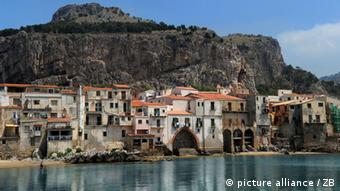Who would have thought it? German taxpayers, who bear the brunt of the euro rescue schemes, are much poorer than Cypriots, Spaniards and Italians, according to a controversial new study by the European Central Bank.
The German government will presumably see this as confirmation that it did the right thing in getting rich Cypriot bank depositors to help bail out their own country. German taxpayers wouldn't have agreed to the bailout otherwise, government sources said at the time.
According to the study, commissioned by the European Central Bank (ECB) and published on Tuesday (09.04.2013), Cypriots are apparently three times wealthier than Germans.
The ECB asked the national central banks in 15 eurozone countries to put questions to a total of 62,000 households about their wealth. Of the 17 member countries in the common currency area, Ireland and Estonia were the only ones that didn't take part. The participants' assets like deposits, real estate and cars were added together, and their debts subtracted.
Controversial results
The results are striking, and they're proving controversial. It appears that households in crisis-stricken countries have considerably more wealth on average than those in the reliable northern countries of the currency union.
Cyprus, for example, has just been rescued from bankruptcy. But the study places the small island state second-highest on the wealth list. Cypriot households have an average net wealth of 670,900 euros ($878,700). It's a result only surpassed by Luxembourg, with 710,000 euros per household.
The two big ailing countries, Spain and Italy, rank fifth and sixth – both with an average wealth of just under 300,000 euros. That's a lot less than the first two, but it's also a lot more than what the study says Germans have.
Germany is number nine on the list, with an average 195,200 euros per household. Austrians and French are found to be wealthier. Meanwhile, Germany's two allies in the euro rescue attempts, the Dutch and the Finns, are even worse off.
In other words: Taxpayers in northern European countries are guaranteeing emergency credits, and could soon face higher taxes, to help southern countries out of trouble and to keep the currency union intact. Yet the study suggests that they are actually less wealthy than the people they are paying to save.
Take a closer look!
Outrageous, one might think - which is why statistics experts are warning that it's important to take a much closer look. Pensions, for example, were not taken into consideration.
"That creates distortion in the results," says Walter Krämer, the director of the statistics faculty at Dortmund University. "They don't appear in the study because in some countries, like Germany, they are not considered part of the wealth of a household," he told DW in an interview.
In Germany, pension insurance is very high in comparison with other countries. And according to the German Central Bank, it's also an important reason why many Germans don't feel the need to accumulate private wealth in the first place. They assume that their pension contributions will ensure that they have enough money to live off when they retire.
Another point statistics experts criticize is that the study doesn't provide any insight into individual wealth, because it doesn't take into account how many earners there are in a household. "Cypriot households, for example, are traditionally bigger than German households," says Walter Krämer.
The results are also qualified by the fact that the study takes real estate as one of the decisive factors in a household's private wealth. In Spain, 83 percent of households own a house, while in Germany, only 44 percent own the flats or houses they live in.
One reason for this is that German banks have traditionally been more cautious in giving out mortgages, focusing on applicants' own capital and creditworthiness.
Another is that there's been a change in attitude in Germany in recent decades. Young families don't necessarily dream of their own home out in the countryside any more. They often stay in the big cities and rent. A growing number of single-person households in Germany also means that the rate of property owners is lower there than in other countries.
The bubble has burst
So while in Germany renting is not an indication of poverty, in countries like Spain, owning property is not necessarily an indication that a person is rich. Many countries in the eurozone have seen their real estate bubble burst. People who bought a house during the economic boom now risk not being able to pay back their debts. The ECB figures for Spain, for example, were collated in 2008. Real estate prices there have slumped by 40 percent since then.
But while some of the data may be old and not far-reaching enough, Walter Krämer believes wealth studies like the one commissioned by the ECB are still important. "It's still better than nothing. If you just look close enough, all the data and all the figures are there," he says. But he adds that it is crucial to examine carefully how these data are published and interpreted. "The media have to be aware of their responsibility," he says, "because not everybody reads the small print."
But despite all the criticism, the study's core revelation remains valid: There is still massive private wealth in southern eurozone countries, even as some of the states have piled up huge mountains of debt. In addition, the richest 10 percent of households in the eurozone possess almost half the total wealth of the entire common currency area. dw de





No comments:
Post a Comment